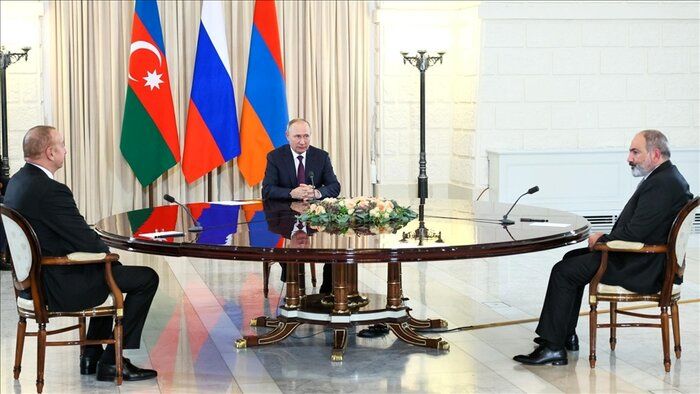Referring to the summit meeting between the leaders of Armenia, Azerbaijan Republic and Russia in Sochi during which Baku and Yerevan agreed to use force or intimidation against each other, Mohammad Reza Damavandi told the Strategic Council on Foreign Relations that “a week before the tripartite meeting, the spokesperson of the Russian Ministry of Foreign Affairs announced that a “wide range” of tripartite and bilateral issues will be discussed in these talks. A few days later, the Kremlin explained in another statement that issues related to “reconstruction and communications and transportation” were among the topics discussed at the meeting.
He continued that “the day before this tripartite meeting, the Deputy Foreign Minister of Russia said that there are going to be negotiations regarding the signing of the peace treaty between Armenia and the Republic of Azerbaijan, and we hope that an agreement will be reached on various issues, including the signing of the peace treaty.
He added that when we put these positions together, it seems that the dialogue is not a single issue, and at the same time, Russia is trying to show its mediating role in resolving the disputes between the Republic of Azerbaijan and Armenia.
This expert on Caucasus issues said that in the Kremlin’s official statement, it was also stated that we did not reach an agreement on all issues, but there was an understanding on the basic issues. Putin also read the space positively, considering it a good ground for possible future agreements; But in the bilateral meeting between Putin and Pashinyan before the tripartite meeting, two significant points were raised.
Recalling that Putin said in this meeting that the conflict has been going on for several decades and that it must be stopped now, and that Yerevan now has a political will to end the conflict, and we support it in any way”, Damavandi added that it seems that Russia has come to the conclusion that the differences between the Republic of Azerbaijan and Armenia are moving in a direction that has moved away from the past and that these two countries are closer to peace.
He stated that the presidents of Russia, Azerbaijan and the Prime Minister of Armenia emphasized on adherence to the agreement on the full normalization of bilateral relations between Baku and Yerevan, and said that Russia is trying to register this understanding in its name.
“Moscow wants to show its role in moving towards the end of conflicts between the two countries for the concessions that it wants to exploit in the future.”
Referring to Pashinyan’s trip to Tehran immediately after the end of the Sochi meeting, this expert on Caucasus issues stated that this action was worthy of consideration, and Pashinyan mentioned in the meeting with President Raisi that Armenia wants Iran to be in the process of agreements. In the report he presented to the Parliament in Yerevan, he also said that Sochi summit is definitely a step towards the “implementation” of the peace plan.
Damavandi emphasized that it seems that the Sochi meeting is one of the last steps for the dialogue towards the signing of the peace treaty, and this treaty will be finalized soon.
“If we also take into account the informal talks that took place in Prague between Erdogan, Aliyev and Pashinyan, and that a few days later, the Turkish Foreign Minister said, “In our opinion, the peace treaty between the Republic of Azerbaijan and Armenia is over and it only needs to be implemented”, it can be concluded that the peace agreement and the Sochi meeting were for the final conclusion of this issue.
Recalling Pashinyan’s proposal that “we are ready to sign a document on extending the mission of the Russian peacekeepers for 10, 15 or 20 years”, this analyst of Caucasus issues said that the energy transmission line of the region to Europe while providing energy to Europe and transforming this region and Turkey to the hub of energy, will give power to Russia to control it.
According to Damavandi, Russia advances the game in several directions.
“Perhaps, the issues related to the war in Ukraine cannot be seen to have a direct and clear effect on the developments in the South Caucasus, but in this game, there are exchanges of positions and points for the parties, and they try to gain the lost points on another front. Russia is trying to keep pressure on Europe by having the upper hand and keeping itself active. But the difference is that with the mediation that was done for the energy transmission line and by having the ultimate control, Moscow will keep Europe in need and under its pressure.










0 Comments